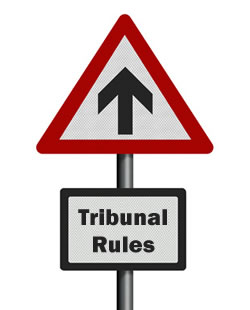 From 29 July 2013 we have new Employment Tribunal rules which apply (with very limited exceptions) to all on-going and new Tribunal and EAT cases, as long as the Respondent receives a copy of the claim form from the Tribunal on or after that date.
From 29 July 2013 we have new Employment Tribunal rules which apply (with very limited exceptions) to all on-going and new Tribunal and EAT cases, as long as the Respondent receives a copy of the claim form from the Tribunal on or after that date.
The new rules include:
- Sanctions for non-payment of Tribunal fees: a claim form will be rejected if it is not accompanied by the relevant fee or an application for a reduction against that fee.
- An initial sift stage: at which every case will be reviewed on paper by an Employment Judge to consider its prospects and what case management tasks should be done. This already happens for most purposes, but, hopefully, the express requirement in the rules to check for weak claims will focus the minds of Judges carrying out the sift, encouraging more robust case management and a more effective use of the sift process.
- Clarify on making deposit orders: there is greater clarity in the new rules that a Tribunal has the power to issue a deposit order against a particular allegation or argument within a claim, rather than always the whole of that claim. The rule did exist before but there was some confusion over it. It now allows a Tribunal to be more particular in weeding out particularly unmeritorious aspects of a certain claim, and we believe it makes it more likely that the use of deposit orders will increase, which will generally assist employers.
- Removal of the £20,000 cap on costs that can be awarded by a Tribunal: Tribunals will be allowed to carry out detailed costs assessments for costs awards above £20,000 without having to refer such to the County Court.
- Rule to permit Tribunals to limit oral witness evidence and representatives’ submissions at hearings: This already happens at most Tribunal centres in any event, but this practice is likely to become more widespread with the express endorsement of this practice in the new rules.
- National guidance from the Presidents of Employment Tribunals: to supplement the new rules, aid consistency of approach and helping parties to understand what is expected of them, the President has the power to issue national guidelines.
- Less rigid approach to applications to extend time to respond to a claim: the new rules expressly allow employers to ask for an extension to the 28-day time limit for responding to a claim even after the time limit has expired.
- Shorter time limit for employer counter-claims: the new rules reduce this time limit to 28 days and make it clear that any such counter-claim must be set out in the response to the claim. Any counter-claim will attract a Tribunal fee of £160.
- Claimant’s withdrawal of claim leads to its automatic dismissal: This is good news for employers, as the new rules on Tribunal fees introduces a compulsory fee for respondents applying to dismiss a withdrawn claim. Given the automatic dismissal rule, the requirement for payment of a fee should not arise often. However, automatic dismissal won’t apply if the claimant says they want to reserve the right to bring a new claim in the future and the Tribunal is satisfied there would be a legitimate reason for bringing a new claim or believes dismissal would not be in the interests of justice.
- Reconsidering judgments: the rules set out a new procedure (replacing the current one, which is called a “review”) under which any decision of the Tribunal can be “reconsidered”, either on the Tribunal’s own initiative or at the request of a party.
- Parties’ co-operation: the rules make it clear that parties are expected to co-operate generally with each other and the Tribunal. There is also a new requirement to copy in all other parties on any correspondence with the Tribunal.
- Changes in terminology: “preliminary hearings” will replace what we currently call pre-hearing reviews (PHRs) and case management discussions (CMDs). Apparently unrepresented parties often became confused between the two types and therefore such confusion has now hopefully been removed.
- Mediation and settlement: the new rules provide that Tribunals shall, wherever practicable and appropriate, encourage and facilitate the use by the parties of ACAS, judicial or other mediation, or other means of resolving their disputes by agreement.
Comment: The rules are generally in welcome plain English and so are more user-friendly than the current set. These should provide a good framework to manage cases more flexibly and efficiently and speed up the litigation process, which can only be a good thing. However, of course, we will ultimately have to wait and see what impact the new rules will have in practice.
 From 29 July 2013 we have new Employment Tribunal rules which apply (with very limited exceptions) to all on-going and new Tribunal and EAT cases, as long as the Respondent receives a copy of the claim form from the Tribunal on or after that date.
From 29 July 2013 we have new Employment Tribunal rules which apply (with very limited exceptions) to all on-going and new Tribunal and EAT cases, as long as the Respondent receives a copy of the claim form from the Tribunal on or after that date.